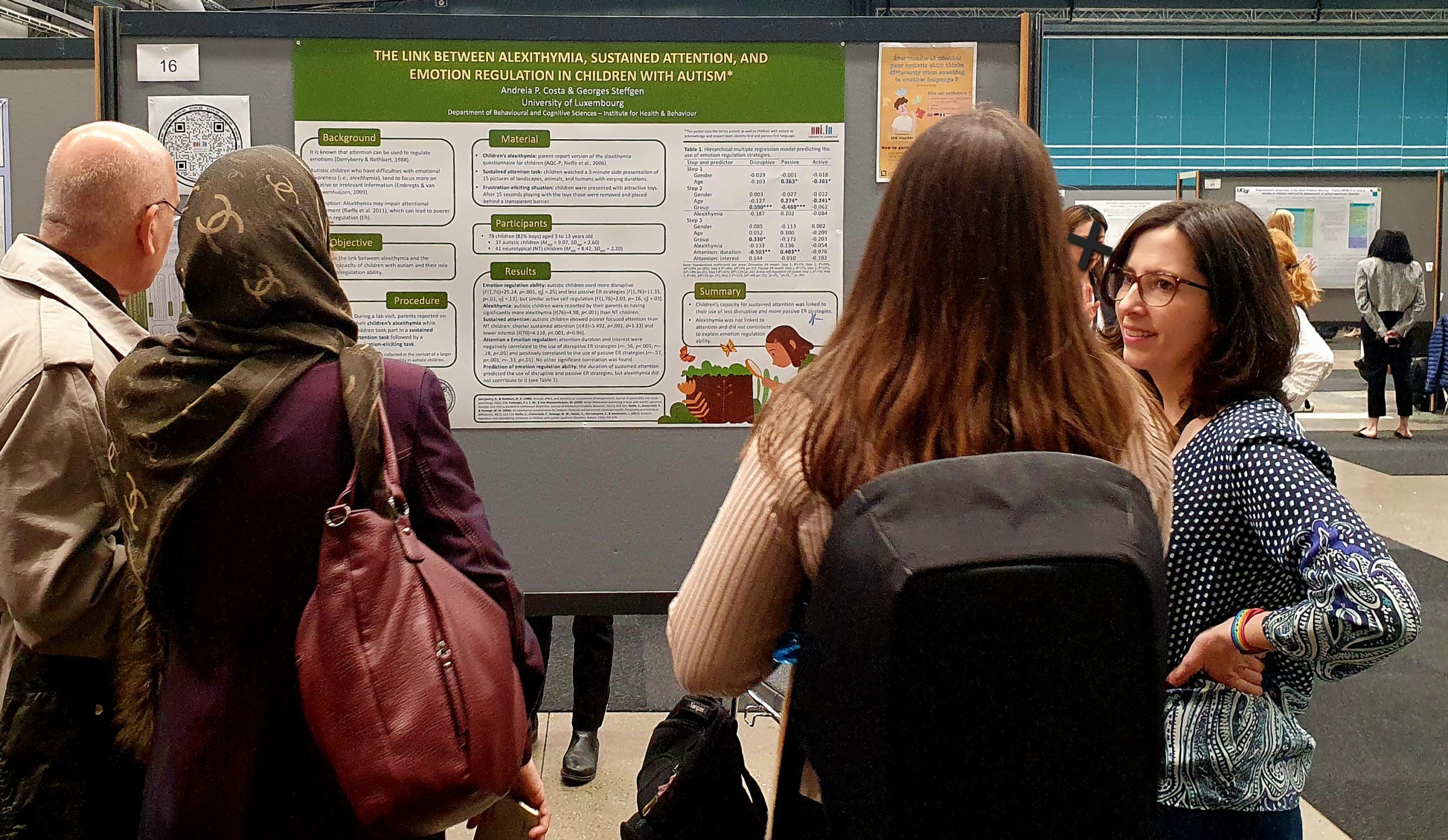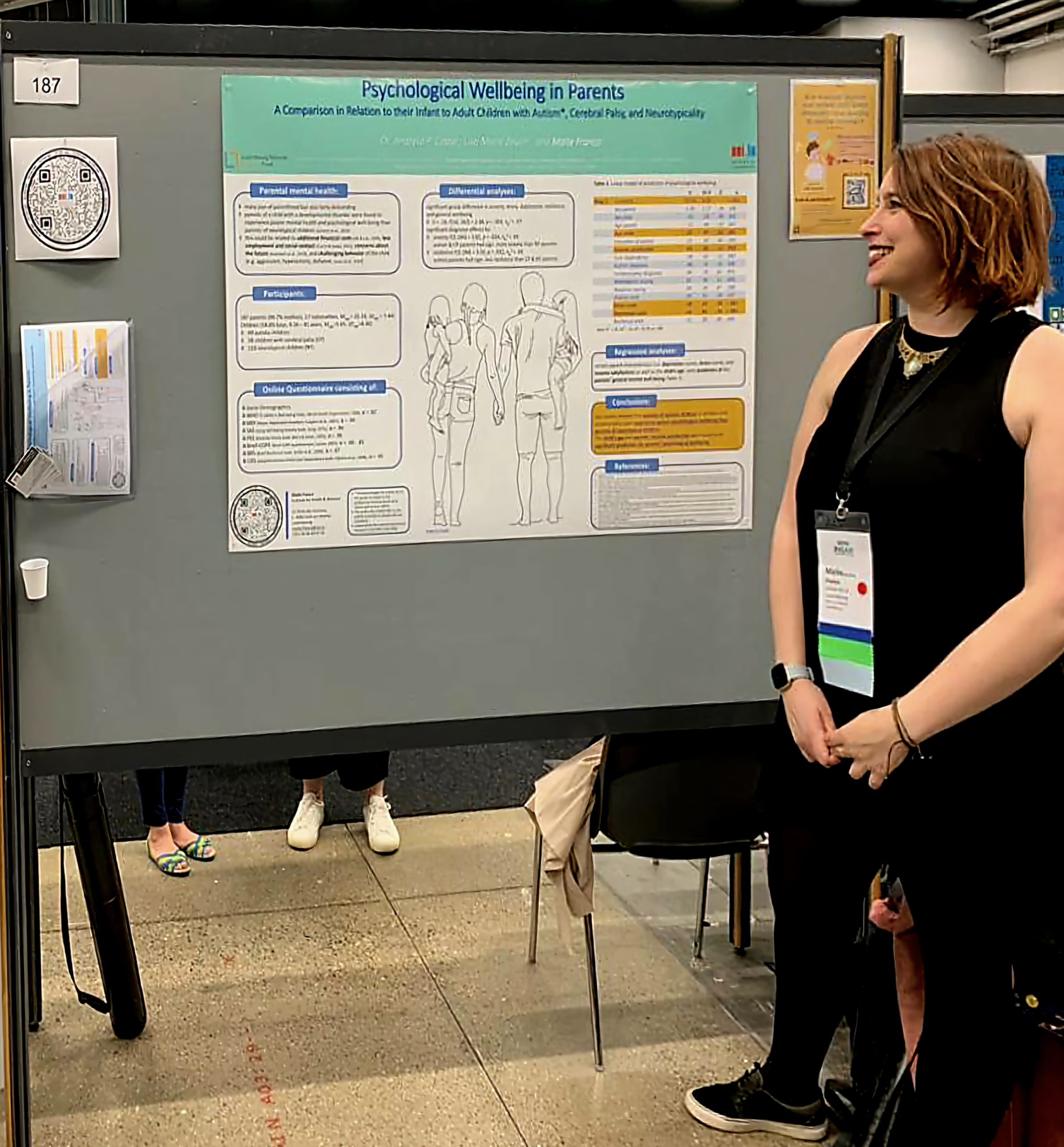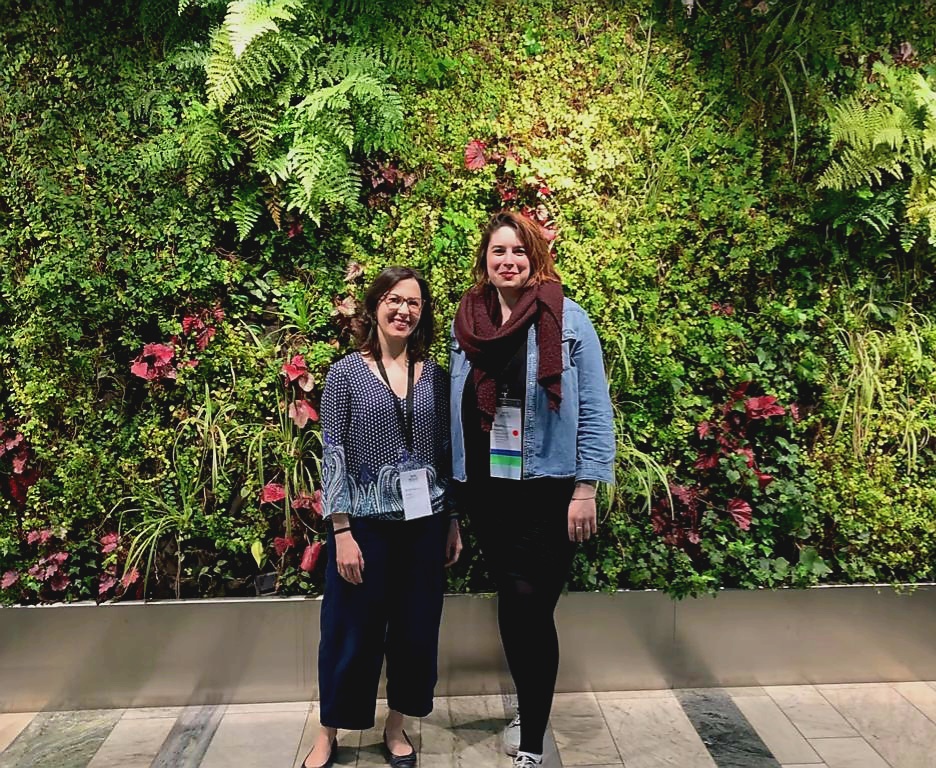Andreia P. Costa and Georges Steffgen (POSTER)
Dr. Andreia Costa presented her research on the link between alexithymia, sustained attention, and emotion regulation in autistic children.
Andreia P. Costa and Georges Steffgen (POSTER)
Dr. Andreia Costa presented her research on the link between alexithymia, sustained attention, and emotion regulation in autistic children.
It is known from previous research that attention can be used to regulate emotions. Autistic children who have difficulties with emotional awareness (i.e. alexithymia) tend to focus more on negative or irrelevant information. This leads to the assumption, that alexithymia may impact attentional development negatively, which can lead to poorer emotion regulation (ER). The study aimed to analyze the link between alexithymia and the capacity for attention of autistic children, as well as their role in the children’s emotion regulation ability. The study consisted of 37 autistic children and 41 neurotypical children between the ages of 3 to 13 years, as well as one parent respectively.
As expected, autistic children were found to display more disruptive and less passive emotion regulation strategies, to have more alexithymia, and poorer focused attention. At the same time, higher levels of sustained attention were found to be linked to less disruptive and more passive emotion regulation strategies. Alexithymia was found to have no impact on attention and did not contribute to explaining the emotion regulation ability. Regression analyses revealed that the duration of sustained attention could predict the use of disruptive and passive strategies above and beyond autism diagnosis. However, alexithymia did not contribute to it.

Maïte Franco, Lisa Marie Zeuch, and Andreia P. Costa (POSTER)
M.Sc. Maïte Franco presented her research on the psychological wellbeing of parents.
Parenthood brings many joys, but it can also be quite demanding, especially for parents of children with atypical developmental. Research shows that these parents tend to experience poorer mental health and psychological well-being compared to parents of neurotypical children. This could be due to several factors, such as additional financial costs, reduced employment opportunities, and limited social contact. Moreover, concerns about the child’s future and dealing with challenging behaviors like aggression, hyperactivity, and defiance can take negatively influence their well-being. Our study compared, via an online questionnaire, levels of anxiety, stress, depression, resilience, and general well-being of 187 parents, of which 49 were parents of autistic children, 110 were parents of neurotypical children, and 28 were parents of children with cerebral palsy. The children were between the ages of 2 months to 41 years old.
Differential analyses showed a significant group difference in the five outcome variables (i.e. anxiety, stress, depression, resilience, and general wellbeing) based on the child’s diagnosis. This means that parents of autistic children and children with cerebral palsy each experience poorer psychological wellbeing compared to parents of neurotypical children. Furthermore, parents of autistic children and children with cerebral palsy each experienced significantly more anxiety, and parents of autistic children were significantly less resilient than parents of neurotypical children or children with cerebral palsy. Using a multiple linear regression analysis, we also found that certain parent-characteristics (i.e. depression scores, stress scores, and income satisfaction) as well as the child’s age, were predictors of the parents’ general well-being.

Louise Charpiot, Andreia P. Costa, Eva Nittenwilm, Stefan Martins, Dana Paulus, Catarina Godinho, Meret Hoffman, Maria Vintila, and Georges Steffgen (POSTER)
Dr. Andreia P. Costa presented also M.Sc. Louise Charpiot‘s work on autism performance in children with a robot or tablet.
The care and education of autistic people can be challenging regarding their cost, accessibility, and turnover. Robots have potential benefits in therapy, education, knowledge transfer, and care accessibility, but they are not widely available, user friendly, and can be expensive. While robots offer a multi-modal experience that might play an important role in interpersonal relations, it is uncertain how much benefit it brings compared to tablets with similar advantages. Our study investigated which difference may exist between the use of these two technologies, how autistic children interact with each device, and how they enjoy them. Eleven autistic boys between the ages of 9 to 17 listened to two stories provided either by a robot or a tablet.
Statistical analyses demonstrated no difference regarding children’s proximity and eye gaze. While the children did not differ significantly on accuracy for memory questions about the provided story, they showed more stereotyped and repetitive behaviors when interacting with the robot than with the tablet. In addition, children expressed a clear preference for the tablet (72.7%) than for the robot storyteller (27.3%) and stated that they would prefer working with a tablet (90.9%) than with their usual professional (9.1%) or the robot (0%). This preference for tablets might be because they are easier to use and more familiar, and children might have interacted with them before already.

For more information, please contact us at autisme@uni.lu.
SUBSCRIBE FOR NEWS AND INVITATIONS TO PARTITIPATE IN STUDIES